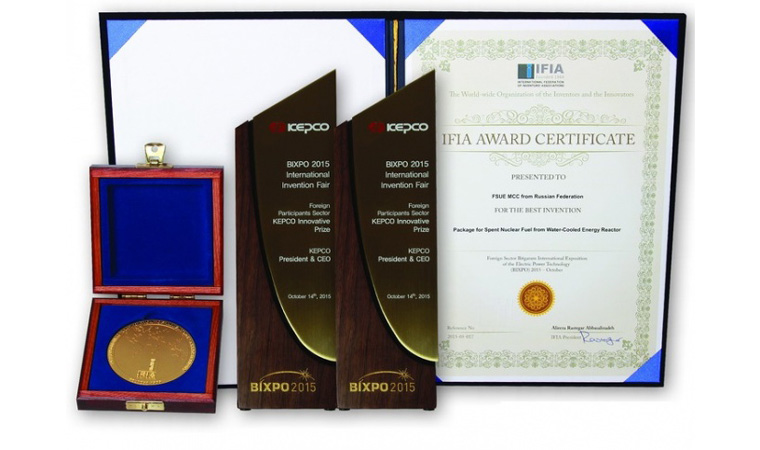
South Korea to adopt best practices from MCP
back to contentsThe event was organized by Korea’s largest electric utility KEPCO (Korea Electric Power Corporation), a parent company of Korea Hydro & Nuclear Power. It hosted a new technology exhibition and an invention fair visited by over 20 thousand people from 35 countries.
The Mining and Chemical Plant, a one-of-a-kind facility with underground fabrication shops, presented Rosatom’s innovations in the back end of the nuclear fuel cycle. MCP itself exhibited two inventions that were acclaimed by international experts and won three awards. The first of them was a four-slot dry cask for VVER-1000 spent nuclear fuel. The new cask will house four instead of three spent fuel assemblies, offering improved logistics while maintaining nuclear and radiation safety.
Visitors and exhibitors also appreciated the second invention – voloxidation, a new spent nuclear fuel reprocessing technology. It improves efficiency and environmental safety of spent nuclear fuel management by eliminating liquid radioactive waste.
The inventions presented by MCP won BIXPO 2015 awards. The four-slot cask for VVER-1000 spent nuclear fuel was also awarded with a special prize by the International Federation of Inventors’ Association.
Ivan Bogachov, MCP Deputy CEO and Chief Economist, said, “Top managers of KEPCO’s engineering division took much interest in our products. This is because Koreans have recently made a huge step forward in all nuclear-related fields, except for the back end of the nuclear fuel cycle. They want to tap to the expertise of Rosatom, which has made real progress in closing the nuclear fuel cycle and developing advanced spent fuel management technologies.”
Today MCP is a hi-tech spent nuclear fuel management facility that has accumulated solid expertise as a centralized storage site for spent nuclear fuel. Most notably, MCP possesses a spent fuel dry-storage technology based on the passive safety concept. The technology ensures safe storage by maintaining natural convection of cooling air even if power supply is lost. On top of that, dry storage is five times more cost-efficient than wet storage.
MCP is building a pilot center for spent nuclear fuel reprocessing. This will be an innovative, zero-effluent facility recycling all of its process water, with radioactive waste solidified. In terms of environmental safety, the new facility will outperform other reprocessing plants both in Russia and abroad.




